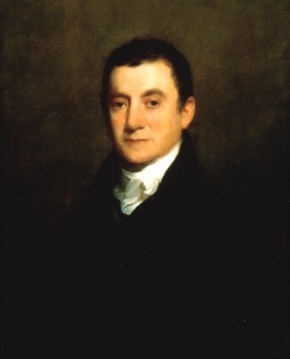You are here
Circuit Court Opinions:
Associate Justice Henry Baldwin, United States v. Holmes (1842)

United States v. Holmes, 26 F. Cas. 360 (C.C.E.D. Pa. 1842) (No. 15,383) [Third Circuit]
In 1841, the American ship William Brown was traveling from Liverpool, England, to Philadelphia when it struck an iceberg 250 miles from land. It quickly became apparent that the ship would sink. The captain, all crew members, and approximately half of the passengers escaped into the ship’s two rowboats: a longboat and a jolly boat. The thirty-one passengers who could not fit on the boats went down with the ship.
Almost immediately after it was launched, the longboat began to leak. The crewmen rowed while the passengers bailed water out of the boat. In the opinion of the crew, the boat and its passengers were doomed. Even apart from the leak, the boat was overloaded. The number of people on board made the boat too heavy to row to shore, and if it were to strike ice, the boat would quickly become swamped and sink. The chances of rescue by another vessel were slim.
Approximately twenty-four hours after the shipwreck, heavy rain began to fall, and the sea became rough. The boat began to take on more water, and with several icebergs in view, the chances of a collision increased. In desperation, the crew began to throw passengers overboard to lighten the boat. In all, sixteen passengers were killed in this manner. No crew members were thrown overboard. The following morning, the weather cleared, and the boat was rescued by a passing ship. All those not thrown overboard survived.
After reaching Philadelphia, Alexander Holmes, one of the crew members who had participated in ejecting the passengers from the boat, was charged with manslaughter on the high seas under the Crimes Act of 1790. Holmes was the only crewman to be found in the city and was therefore the only one charged. The act provided for imprisonment for up to three years and a fine of up to $1,000 upon conviction. In charging the jury, Justice Baldwin explained that manslaughter, unlike murder, did not require a showing of malice. The absence of malice did not excuse the killing of another person.
Baldwin was sympathetic to the plight that Holmes and his fellow crew members had faced and noted that the captain and second mate (who had not been in Holmes’s boat) had testified to Holmes’s good character. He explained to the jury that, in general, a person was not obligated to sacrifice his or her life in order to save that of another. Were two people in a situation where both could not survive, neither would “commit a crime in saving his own life in a struggle for the only means of safety.” This principle applied, however, only where the survivor was “under no obligation to make his own safety secondary to the safety of others.” In this case, the ship’s crew was obligated to ensure the safety of its passengers. “It is the sailor,” said Baldwin, “who must encounter the hardships and perils of the voyage.” Under the law, Holmes was obligated to make any sacrifice necessary, including that of his own life, to protect the lives of the passengers. After receiving this instruction, the jury convicted Holmes of manslaughter, but recommended that the court show him mercy.
Holmes requested a new trial on the grounds that Baldwin should have instructed the jury that “in a state of imminent and deadly peril, all men are reduced to a state of nature, and that there is, then, no distinction between the rights of sailor and passenger.” Baldwin denied the motion, ruling that the doctrine of natural law could not supersede civil or municipal law. Agreeing with the jury that a light sentence was appropriate in light of the unusual circumstances of the case, Baldwin sentenced Holmes to six months’ imprisonment and a $20 fine.
